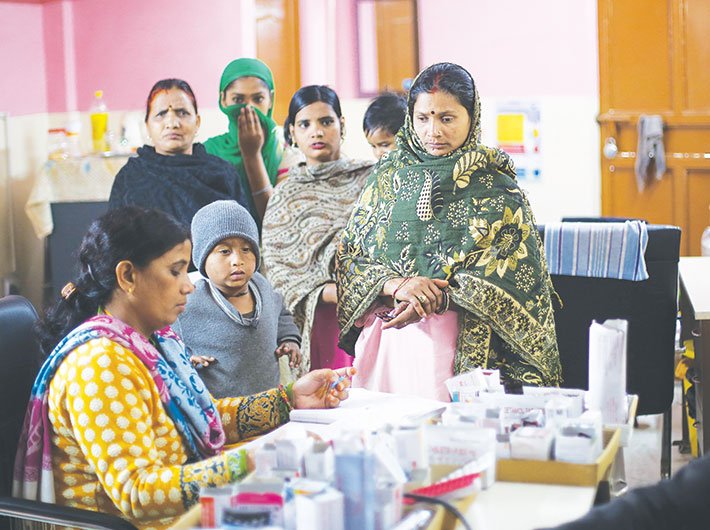With bumper budget allocations, the public health sector in the capital is improving. But a lot remains to be done
The biggest challenge in front of the Aam Aadmi Party (AAP) when it was voted to power in 2015 with a “scary mandate” was healthcare. Improving the health system and making it affordable was one of its key poll promises and after more than two years of governing the capital, it continues to come up with schemes to take healthcare to the masses.
For many, the healthcare system of Delhi has gone through a transformation like never before. This is seen firsthand in the state’s budget allocation. While the central government has assigned a little over two percent of the 2017-18 union budget to healthcare, the capital received an allocation of nearly 12 percent, at Rs 5,736 crore.
In July, the Delhi government announced a free surgery scheme, in which the state will bear the cost of surgery of patients at private hospitals if the government hospitals were unable to operate within a month. The scheme is applicable for Delhi residents from any income group who are undergoing treatment at one of the 24 specified government hospitals and are allotted a date of surgery after 30 days of diagnosis or if the specified surgery is not performed in the hospital.
The one-of-a-kind scheme in the country has taken many by surprise. On the launch of the scheme, chief minister Arvind Kejriwal said that this was the third in the series of healthcare initiatives by the Delhi government after providing free medicines and free medical tests at private diagnostic centres.
Deputy chief minister Manish Sisodia, in this government’s maiden budget for 2015-16, announced a 45 percent hike in the planned expenditure of the previous year on health – from Rs 2,164 crore to Rs 3,138 crore. The budget for health was at Rs 4,787 crore, which was over 11 percent of the total budget. The second budget of 2016-17 too saw a hike of nearly 10 percent (Rs 472 crore) over previous year’s budget to Rs 5,259 crore for health.
Aam aadmi clinics
In line with emphasis on primary healthcare, the initiative of setting up mohalla clinics was a first by the Delhi government. The idea was to develop neighbourhood clinics with simple and effective technology where the common man can get treatment from doctors for selected common diseases. The clinics provide medical check-up, medicines and tests for diseases like malaria, dengue, typhoid, hepatitis and HIV.
“Unlike other states, we are investing more on health. Mohalla clinics are on the lines of private clinics. The idea is to have a doctor and a few attendants to treat the patients so that they don’t have to rush to a hospital immediately,” says Sisodia. He adds, “When [Delhi health minister] Satyendar Jain went to a government public health centre, he found that they were hardly functional and overstaffed. Previously, the government had the idea of making a public health centre with a huge building which would cost around Rs 20 crore. Here, [with mohalla clinics] we came up with such a building costing Rs15 lakh.”
Though the deadline of building 1,000 clinics by 2016-end has been missed, the clinics are a hit among masses and have also received international praise.
Soni Mathur, a resident of Malaviya Nagar, says, “Earlier we used to take medicine for cough and fever on our own or visit a private clinic. But now we go to the nearby mohalla clinic. It is better since there is a doctor in place and we get a fresh check-up done.” She adds that the decision to provide free medicines in the clinics is also welcome. “Earlier people had to buy the same medicines from their own pocket, but now it is available to them without paying a single rupee,” she says.
But the initiative is not free from teething troubles.
The number of clinics is insufficient. Currently only 110 mohalla clinics are functional including some near night shelters like those at Shakurbasti and Sarai Kale Khan to treat the poor. Health experts say that the scheme’s impact cannot be assessed with such a small number. Full assessment will have to await the completion of the project. Moreover, the implementation of the scheme is not uniform. Apart from routine check-ups, some clinics provide immunisation to children and centres for DOTS (directly observed treatment, short-course) of TB patients; these services are not available in other centres. Additionally, not all clinics provide all the promised services. While the Delhi government had promised 212 tests, only around 25 tests are conducted.
The Delhi government has envisaged a three-tier healthcare structure in which mohalla clinics constitute the first tier. Polyclinics and government hospitals follow. “If the person needs treatment from a specialised doctor, then there are polyclinics, which are at the second tier of the Delhi healthcare system. And if someone needs long-term treatment, then there are government hospitals. The decision was taken to ensure a more systematic approach towards governance,” says Sisodia.
Free surgeries
The waiting period list for surgeries in government hospitals is shocking. While private hospitals are a costly affair, patients have no other option but to endlessly wait for their turn at government hospitals. For tackling this, the Delhi government came up with the free surgery scheme. Under it, if the waiting period for 52 kinds of surgeries listed by the government, like heart bypass, cataract and kidney stones removal, is more than one month, patients would be eligible to get it done in 48 empanelled private hospitals in Delhi NCR.
How did the government get private players in the picture? Sisodia says, “We sat down with the vendors and asked them to give us the best rates in the central government health scheme [CGHS]. For instance, if a certain test or treatment costs Rs 5,000 in a private clinic and under CGHS it costs Rs 1,000, we asked the vendors to give us the best bet and finally it will cost us around Rs 500. For the vendors, it is good business. The facility is the same for all people. We want to invest in the people.”
***
Health minister Satyendar Jain has a busy schedule for the day, starting with a public meeting at his residence at 10 am. One by one he lends ear to every complainant and assures them of action before turning to the next one. One family eagerly awaits Jain with a bouquet of flowers. After the meet-and-greet session, Jain begins to speak about his brainchild: “We looked at the waiting period of the surgeries in government hospitals. The list was shocking. While some hospitals had a waiting period of six months, in some cases it went up to a year or more. We knew this cannot work and building a hospital would take a really long time. For instance, it doesn’t make sense if someone needs a bypass surgery and the waiting period is almost two years. Therefore, we thought we needed a new scheme that would bring down the waiting period at the hospitals.”
While the long-term effect of this policy is yet to be seen, Jain says that it is yielding immediate results. “We will conduct a ground check after a span of six months. As of now, we see that the government hospitals have become alert and they are conducting surgeries at a fast pace. This is good for the government as well as the private hospitals. If this move can act as an alert for the government hospitals to function fast, then nothing like it. It is a positive step for us,” Jain says with a smile.
However, the government maintains that they haven’t set aside a separate budget for the scheme. “The chief minister has assured us that there will be no dearth of funds for this scheme. When a review is conducted, probably then it can be decided as to how much funds are needed. Now is just a testing period,” says a senior health official in the Delhi government.
Free medicines scheme
Along with these initiatives, almost all medicines in Delhi’s list of essential drugs are given for free in government hospitals. Officials in the health department say that a budget has not been granted to the medical superintendents of the Delhi government hospitals.
ankitasharma@governancenow.com
(The story appears in the October 31, 2017 issue)

